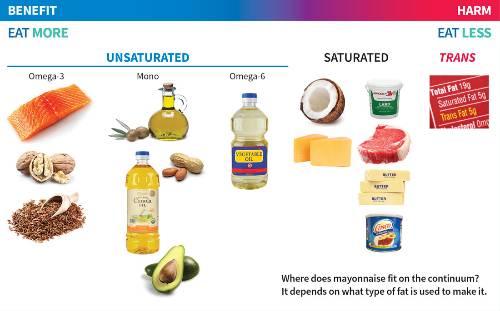Dietary Fat
Article by: Cheryl Barnes, SNAP-Ed Nutrition Educator
Douglas County SNAP-Ed is a nutrition education program provided at no cost to Douglas County families with limited resources. Our goal is to provide nutrition education to individuals and families who receive food assistance or who are eligible to receive food assistance. We have provided a series of programming for seniors called “Seniors Eating Well” at Babcock Place, Clinton Place, and at the Eudora Recreation Center. Dietary fat is one of the topics that is covered in this curriculum.
There are many reasons why fats are essential in the diet. First, fat adds flavor and a pleasing texture to food. Fat also helps provide a feeling of fullness. Next, dietary fats carry and help our bodies absorb necessary fat soluble Vitamins; these are Vitamins A, D, E, and K. Plant foods and oils, like olive oil, are a heart smart fat choice because of the high amounts of unsaturated fat, specifically monounsaturated and polyunsaturated fats.
Strive to choose unsaturated fats over saturated through reading food labels. Recognize that the fats we are trying to limit are solid at room temperature and the fat we want to choose instead are liquid at room temperature. When a recipe calls for a solid fat such as butter, if possible, substitute a liquid vegetable oil.
The visual below gives a continuum of fats to increase in the diet and types of fats to limit.

Strong and consistent evidence shows that replacing saturated fats with unsaturated fats, especially polyunsaturated fats, is associated with reduced blood levels of total cholesterol and artery clogging LDL cholesterol. Evidence also shows that replacing saturated fats with polyunsaturated fats is associated with a reduced risk of cardiovascular disease events and related deaths.
Here are some tips to help you make over the fat in your diet:
- Use oil instead of solid fats. For example, sauté with olive oil instead of butter, and use canola oil when baking.
- Prepare fish, such as salmon and mackerel, instead of meat at least twice a week to get healthy omega-3 fatty acids. Limit sizes to 4 to 6 ounces of cooked seafood a serving, and bake or broil seafood instead of frying.
- Choose lean meat and skinless poultry. Trim visible fat from meat and poultry, and remove skin from poultry.
- Snack smart. Many popular processed snack foods are high in fat, especially solid fats. Be sure to check food labels for saturated fat. Better yet, snack on whole fruits and vegetables.
In conclusion, healthy fat choices discussed in this lesson included lowering the amount of saturated fat in the diet, eliminating trans-fats, and opting for mostly unsaturated fats from plants and fish when choosing and preparing foods.
